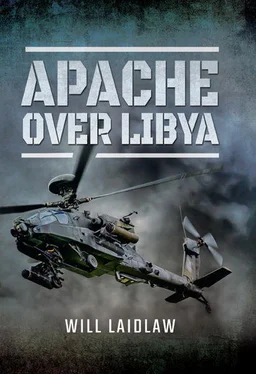He always wore a half quizzical grin, perfect for man in his line of work. ‘How do you fancy unlocking a war?’ A fair ask, given that it had gone on long enough, we were probably running out of luck and a rapid win was what we were in it for.
Nick was quick to reply: ‘But what would we do afterwards? We’d probably just get sent to fight somewhere else, or worse, get sent home. Some of us would have to get proper jobs, meet our families and everything!’
‘Fair one. However, if you were tempted, the commander of the rebel forces down in the Nafusa Mountains appears to have been admiring your work. Word in the mountains is that if that area gets some Apache attention they might break out. His troops will be in Green Square in two weeks.’
‘Wow, that’s quite a bold shout. Which mountains again?’
The intelligence man pointed at our map. ‘About 50 miles south-west of Tripoli… he’s a big hitter, this guy, and the source is good. This might happen. Just have a think in case the CAOC throw it at you as a fastball, you know, fuel, weapons, routes in and out, all that risk mitigation stuff too.’
It was a curious heads-up. Someone had placed an idea in someone else’s head; it turned into half a plan, then made its way to us. This was compelling, completely new. The mountains were a long way inland and the whole land track would be over consolidated pro-Gad territory. No change to any other land mission, but here it was right over Tripoli’s surrounds and certain to be rough all the way. If the rebels thought they were likely to break out from the Nafusa mountains, then Gaddafi might have noticed it too. If Khamis had told his Dad that he’d been well and truly knocked in Zlitan and Brega by helicopters flying low, apparently ignoring his MANPADS and triple-A and smashing his soldiers, then it was likely the regime would guess we would be used on the third front. They would be expecting us.
But nothing came of it. It all went quiet. The chance flashed and then went out altogether. Throughout July we flew coastal missions to Zlitan and west of Tripoli. Several other missions were suggested, planned, briefed and subsequently cancelled when no targets could be verified prior to launch. Our frustration increased. After the blooding of June we were certainly overconfident, and the CAOC were right to clip us when we suggested wilder alternatives, but it was clear we could do more and succeed. Coastal or inland? It was all about risk versus reward, time and need. July wasn’t the time, and we had all but run out of lives in Brega in late June. The need now was for us not to come unstuck – keep the Apache in the campaign for all the reasons it was introduced, but not put it in too much danger. The fanfare was over, the media had gone home, we’d got away with our lives but come close to losing 80 per cent of the squadron’s combat power and aircrew over Brega; brutal war was now our firm reality.
The CAOC didn’t want to send us to the mountains. Our task was to deal with 32 Brigade and not get knocked down. So we got on with the 32 Brigade gauntlet in Zlitan and the coast west of Tripoli.
By the end of July we had flown twenty missions into Libya. Along the way, over those two months, ten more had been cancelled. From the outset the CAOC was clear – they would not allow us to launch unless they were certain we had a valid target to strike. All ten of those cancellations resulted from target uncertainty. A rate of five per month was acceptable and it demonstrated to us that we were being given serious consideration in the CAOC. But it also demonstrated that reconnaissance or other ‘find’ assets were in short supply. These are the frustrations of resource-finite operations. The lower flying rate didn’t change the tempo for our soldiers and engineers. They still had to provide mission-ready aircraft every day, right up to the late night mission cancellation. They endured a monotony of hard work throughout the day, only to see unflown aircraft returned to the hangar late at night. To their credit, not one mission or sortie was lost due to lack of aircraft readiness. They gave us exactly what we needed to fly every day and night of the embarkation; and they went unrewarded with any Operational Allowance.
With ‘finding’ the target out of our control, we were becoming frustrated with the cancellations. We wanted a new place to strike, a new interest to give us the assets we needed for the decision to let us launch. Nick wanted to see what the mountains were like.
By the end of July there was change in our team in the CAOC. Chris James had returned to the UK to take up a new post in the Ministry of Defence and Glen Parker had come out from the School of Army Aviation to replace him. Glen was another deeply experienced Army flyer. He had bounded through the ranks from private soldier to major and had been a helicopter instructor for the last fifteen years, with operational experience in every theatre of conflict the British Army had been to in the past twenty-five years. Six of our ten aircrew had flown with him or alongside him in Afghanistan the previous winter. He knew the Apache and operations but he was about to endure the shock of capture that only a combat operator can suffer when catapulted headlong into a staff job! PowerPoint, email and telephones were not his usual weapons, nor was he used to tolerating the egos of men in flying suits who sit behind desks. After a brief period of orientation, during which he witnessed three of our mission cancellations, he set about finding new Apache targets in a fast jet community. He settled on the mountains…
After the week of the 27 we had a period of maintenance aboard Ocean . We were also in the boredom phase and to stay sharp we got on with everything weapons. With no missions planned for five days we recalibrated the 30mm guns in the air and also fired our own personal weapons from the quarterdeck. Mark Hall gathered the aircrew and went over our guntape, pointing out the best and worst of the footage with lessons on how to improve. We conducted our six-monthly personal fitness tests and got our Operational Record up to date. The flip-flop was busy, but it wasn’t mission planning, it was administration. We wondered if we had run out of opportunities.
Glen Parker scheduled a call from the CAOC and broke the silence. It was Nick’s turn to command the mission and at the given time he picked up the phone, with the rest of the aircrew coincidentally in the stiflingly hot flip-flop.
I sat close to the phone and listened in to the conversation.
Glen dispensed with the polite chitchat: ‘Stop sunbathing and listen in. Do you remember that possible mission to the Nafusa Mountains mentioned last month?’
Nick nodded and said ‘Yes’ while pointing to the mountains on our map. His indication to the rest of us caused an audible cessation in work. Weapon cleaning, report writing and morphine counting stopped, and the aircrew moved in close to hear the conversation.
‘Well, the FLF commander is still there, and an Apache mission is being discussed here on the floorplate as an option. That is if you think it’s still feasible?’ He knew it was feasible and was taunting Nick.
‘What’s the target set?’ Nick replied. ‘More importantly, it’s a long way and our time at the target will be limited, so who will be cueing us on?’
‘Sadly, same detail as before. You’re unlikely to get a Pred, still all booked up on other tasks in Tripoli. However, the Int guys are confident that the area’s been a stalemate for several weeks, and the front line is well defined. Target sets will be much the same, checkpoints and technicals, however there are known to be a few Armoured Fighting Vehicles still operating in that region.’
Glen thus gave him a little hope, although we all thought it might come to nothing without the Pred. We had heard similar before, so we accepted it but didn’t expect much to develop. Our best hope was that because we hadn’t operated there before, Gaddafi’s forces were likely to have remained in the same locations for extended periods. Where NATO aircraft had operated in the same area for more than a couple of days Gaddafi’s troops had become cautious and would move checkpoints frequently in order to thwart the targeting cycle.
Читать дальше












